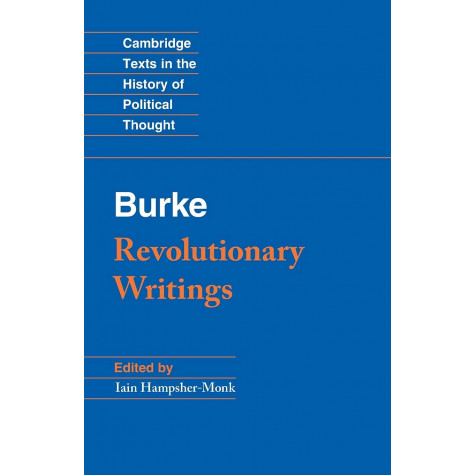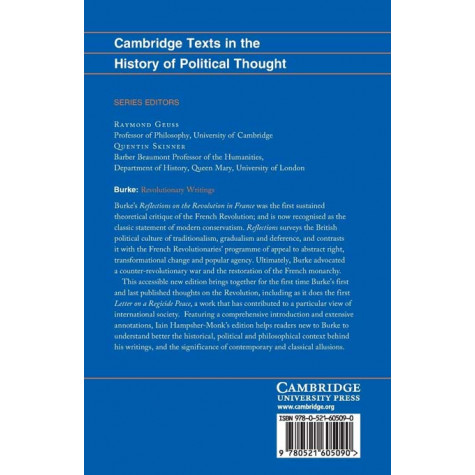Revolutionary Writings
-
Author:
John Locke | Editor: Iain Hampsher-Monk
- Pages: 419
- Year: 2014
- Book Code: Paperback
- Availability:
In Stock
- Publisher: Cambridge University Press
Reflections on the Revolution in France and the First Letter on a Regicide Peace
Burke's Reflections on the Revolution in France was the first sustained theoretical critique of the French Revolution; and is now recognised as the classic statement of modern conservatism. Reflections surveys the British political culture of traditionalism, gradualism and deference, and contrasts it with the French Revolutionaries' programme of appeal to abstract right, transformational change and popular agency. Ultimately Burke advocated a counterrevolutionary war and the restoration of the French monarchy. This accessible new edition brings together for the first time Burke's first and last published thoughts on the revolution including as it does the first Letter on a Regicide Peace; a work that has contributed to a particular view of international society. Featuring a comprehensive introduction and extensive annotations, Iain Hampsher-Monk's edition helps readers new to Burke to better understand the historical, political and philosophical context behind his writings, and the significance of contemporary and classical allusions.
About the Author
John Locke (1632 and ndash; 1704), was a philosopher and physician regarded as one of the most influential English thinkers. He is known as the and ldquo;Father of Classical Liberalism and rdquo; and is considered one of the first British empiricists following the tradition of Sir Francis Bacon.Locke obtained a bachelor of medicine in 1674, having studied medicine extensively during his time at Oxford and worked with such noted scientists and thinkers as Robert Boyle, Thomas Willis, Robert Hooke and Richard Lower. He became involved in politics when Lord Anthony Ashley Cooper, 1st Earl of Shaftesbury, whom he served as his personal physician, became Lord Chancellor in 1672. Around 1679, most likely at Shaftesbury and rsquo;s prompting, Locke composed the bulk of the Two Treatises of Government. While it was once thought that Locke wrote the Treatises to defend the Glorious Revolution of 1688, recent scholarship has shown that the work was composed well before this date. The work is now viewed as a more general argument against absolute monarchy and for individual consent as the basis of political legitimacy.Locke fled to the Netherlands in 1683, under strong suspicion of involvement in the Rye House Plot. He spent most of his time re-working the Essay and composing the Letter on Toleration. He did not return home until after the Glorious Revolution. The bulk of Locke and rsquo;s publishing took place upon his return from exile and mdash;his Essay Concerning Human Understanding, the Two Treatises of Civil Government and A Letter Concerning Toleration and mdash;all appearing in quick succession.Locke and rsquo;s writings had great influence on Voltaire and Rousseau and many Scottish Enlightenment thinkers. His arguments concerning liberty and the social contract later influenced the written works of Alexander Hamilton, James Madison, Thomas Jefferson and other Founding Fathers of the United States. His contributions to classical republicanism and liberal theory are reflected in the United States Declaration of Independence.
About the Editor
Iain Hampsher-Monk is Professor of Political Theory in the Department of Politics, University of Exeter, where he teaches a wide range of courses at undergraduate and postgraduate level, and where he was also Head of Department. He served on two national Research Assessment Panels (2001 and 2008). In 1980 he founded, with his then colleague Janet Coleman, the journal History of Political Thought which he has edited ever since. He is author of A History of Modern Political Thought (1992) which won the 1992 PSA McKenzie Book Prize. He was on the steering group of the European Science Foundation project Republicanism: A Shared European Heritage, and contributed to all three of the titles emerging from it. His work has been translated into French, Spanish, German, Italian, Chinese, Korean and Dutch. He has written numerous articles on political theory including a number on aspects of the thought of Edmund Burke. Two of his edited collections relate specifically to Burke: an anthology of political writings, The Impact of the French Revolution (2005) in the Cambridge University Press series Readings in the History of Political Thought, and Edmund Burke (2009) for Ashgate's International Library of Essays in the History of Social and Political Thought.
Tags:
Revolutionary Writings,
9780521605090,
John Locke,
Iain Hampsher-Monk,
Cambridge University Press


